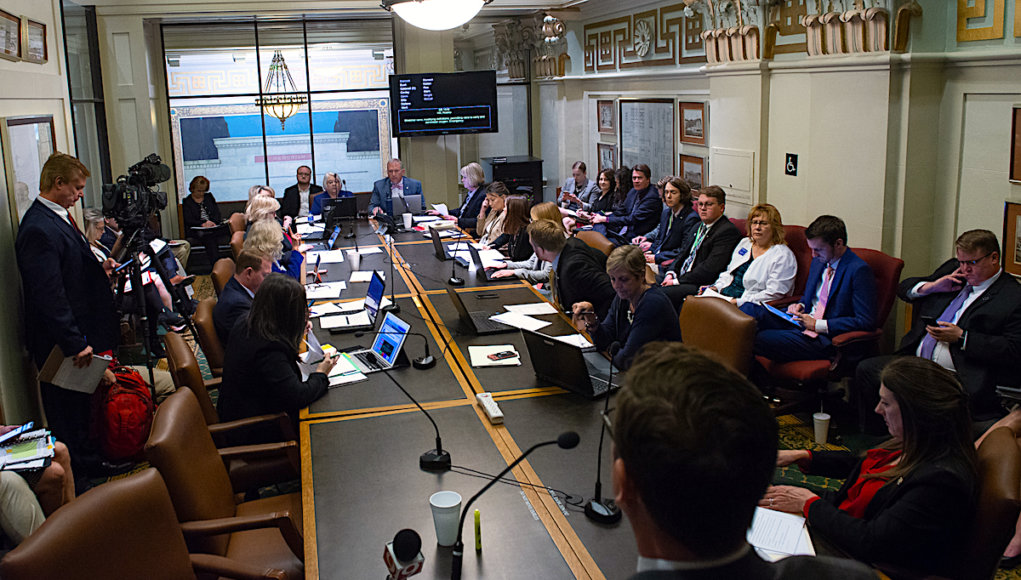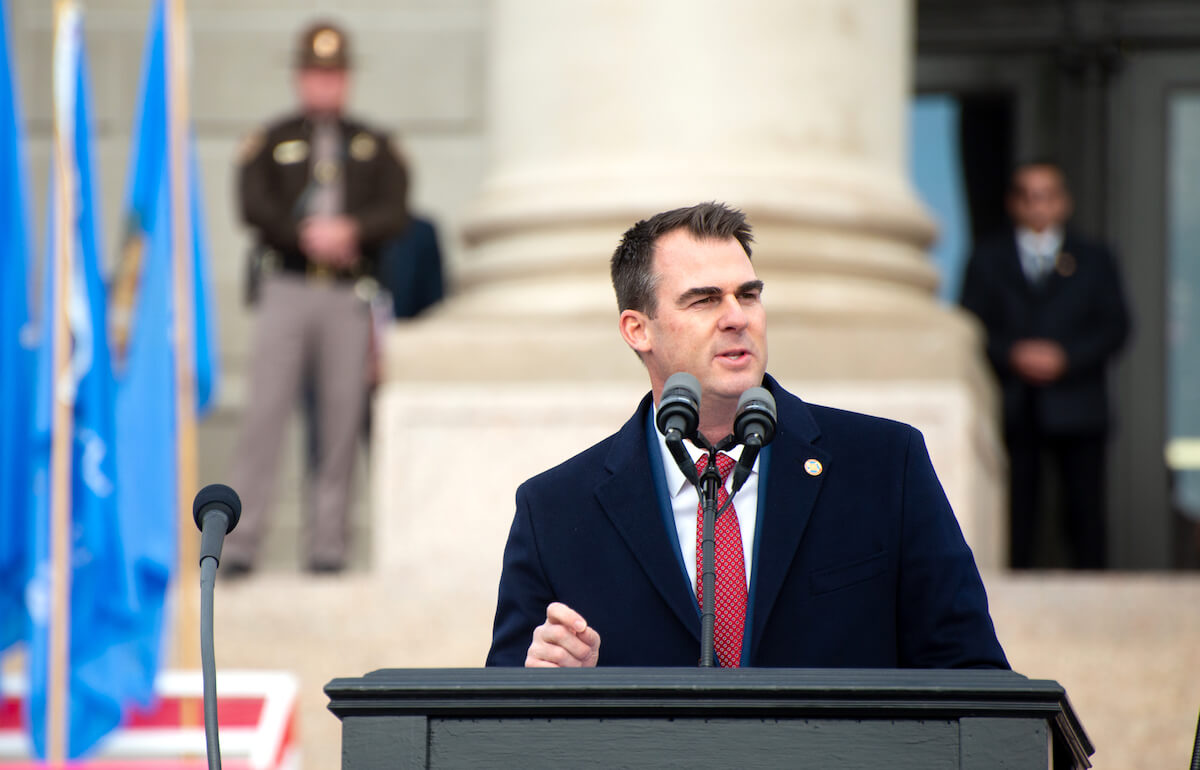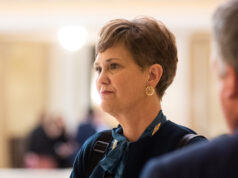
(Update: On Friday, July 5, 2019, Gov. Kevin Stitt issued a new executive order extending his prohibition of state agencies authorizing lobbying contracts with private lobbyists.)
State agencies in Oklahoma spent about $1.5 million each of the past two years on lobbying contracts with private firms, but Gov. Kevin Stitt’s administration intends to take that amount to $0. The governor issued a January executive order that prohibited agencies from signing new third-party lobbying contracts, and his cabinet secretaries have now rejected a handful of agency requests to renew contracts for the next fiscal year.
“At this time, we have no interest in changing anything the governor promised, which [involves] not encouraging contract lobbyists moving forward,” said Donelle Harder, deputy secretary of state.
Lobbyists with those contracts, however, largely argue that the Stitt administration’s decision may result in greater employee expenses for small agencies and a loss of expert knowledge about complicated processes and subjects.
“Agencies contracting with lobbyists makes sense. We’re already there, and we can provide a service to that agency,” said Patrick Gaines, the principle of Gaines Government Services. “If they need help with connections to the Legislature or tracking bills or all the things we do, we can contract with them for a fraction of what it would cost for them to have a full-time employee.”
RELATED
Reform: Gov. Stitt issues his first four executive orders by Tres Savage
Harder described that as a fiscal challenge agencies should be able to overcome.
“With constraint comes opportunity to innovate, so I would challenge them to do what we see other agencies do with other public employee positions, which is enter an MOU agreement and share that staffer with other small agencies,” Harder said. “They say [contract lobbyists] are cheaper than an employee, but that’s just an inability to problem solve. Hire someone and share that cost with another agency who says they cannot afford it either. Combine your budgets and create a shared employee.”
That will be a decision facing the 33 state agencies identified by the Stitt administration as having private lobbying contracts. The administration released a spreadsheet this week specifying whether 314 state agencies, boards and commissions use private lobbying contracts. NonDoc culled the data to feature only those agencies said to have such contracts, and that document is embedded below.
Harder said one factor driving Stitt’s decision is the Oklahoma Open Records Act, which does not apply to the Legislature or private entities who contract with agencies. As a result, an agency using a private lobbyist would not have their communications with lawmakers available via open records requests, but an agency employing a registered “legislative liaison” would.
“The governor has clearly said that there is a role for people who are there to be educational. We just believe that there is a more transparent way to do that,” Harder said. “If you are a state agency that has to live under a certain set of laws, then your individuals who are lobbying the Legislature and are creating additional laws that affect people should have to live under them, too.”
Gaines: Small agencies ‘are the ones that are going to get hurt’
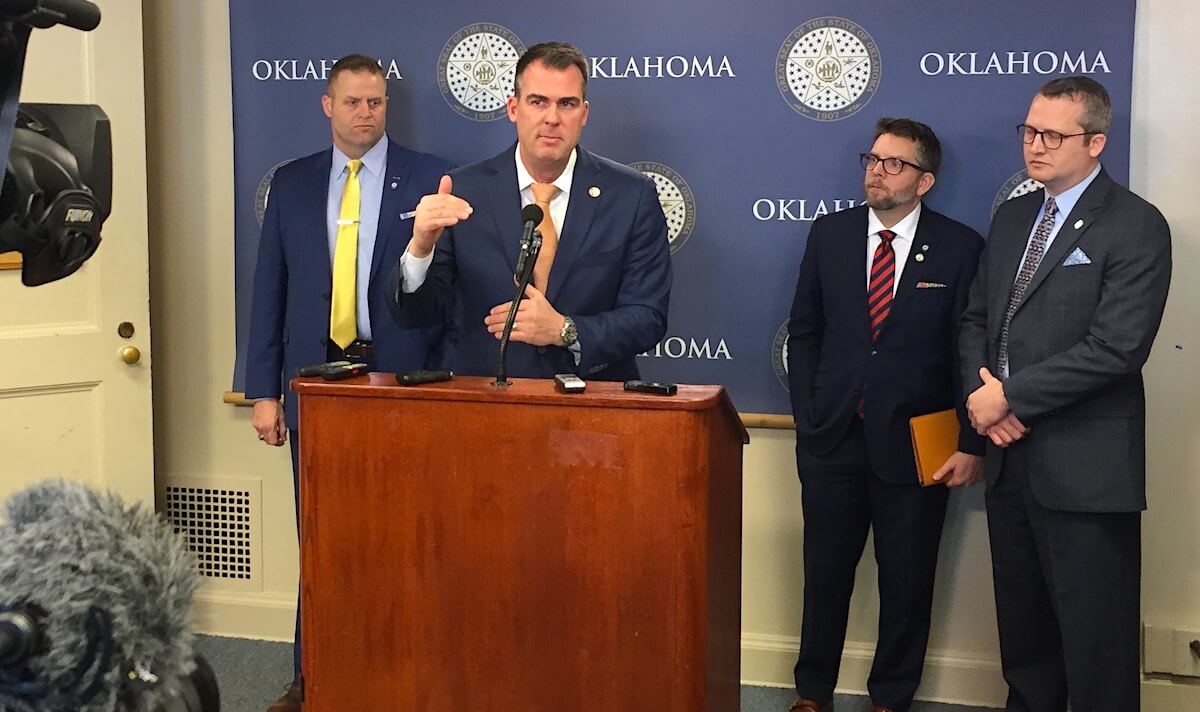
Of 26 lobbyists affected by Stitt’s executive order, NonDoc emailed all of those with active contracts and called half. Gaines and Bobby Stem agreed to speak on the record. Other lobbyists spoke on background, echoing many of Gaines’ sentiments and highlighting a conundrum about speaking publicly: A lobbyist with a state agency as a client does not want to do say anything that could aggravate that client’s boss, Gov. Kevin Stitt.
Gaines shared that concern but said someone needed to stand up and tell the public that contract lobbyists provide affordable and important services to state agencies.
“What is going to happen is a lot of agencies just won’t have liaisons, and they won’t be able to provide information to the Legislature like they should,” Gaines said. “You’re either going to have the director of an agency having to spend their time over there at the Legislature — which I don’t think is the best use of their time — or you’re going to have uninformed people going over there trying at the last minute to provide information. Not to mention the fact that they’re not going to be able to track bills and they’re not really going to know what’s going on over there.”
Stem, who represents the Municipal Power Authority Board, disagreed.
“I actually commend the governor for this action. Although it’s against my self-interest, I believe that his intentions are pure,” Stem said. “The best lobbyist for any agency is the director because, in all honesty, every agency should simply be providing information, not influencing policy.”
For FY 2019 — which ends June 30 — Gaines held two contracts to lobby on behalf of state agencies: the Oklahoma State Treasurer’s Office and the Multiple Injury Trust Fund, which just received more stable funding from this year’s compromise agreement on workers’ compensation adjustments.
In the past, Gaines worked as a legislative liaison for the Oklahoma Insurance Department, an agency large enough to allow a liaison to transition between duties outside of session.
“I think where you get into the problem is when you have agencies that have five people — small agencies, those are the ones that are going to get hurt,” he said.
Follow @NonDocMedia on:
College president: Lobbyist does things ‘I don’t have time to do’
Seminole State College has far more than five employees but has contracted with members of the Brewster political family for more than a decade. Currently, the junior college has a contract with Karel Brewster, the daughter of former congressman Bill Brewster. While Karel Brewster declined comment, Seminole State College President Lana Reynolds said she hopes something can be worked out to retain the Brewsters’ consulting services.
“Lobbying kind of tends to have a negative connotation, but if you’ve been around that any and you’ve witnessed it, you know how valuable that knowledge is and the resource that these lobbyists and consultants can play in helping educate elected officials,” Reynolds said. “I think it would be a great loss to not be able to rely on them to get our message out.”
Reynolds said Harder’s suggestion of partnering with similar state entities “might be an option,” but she noted the extent of Brewster’s relationships and that she assists with everything from accessing federal grant dollars to explaining concerns about firearms on campus.
“They are knowledgable about government relations on the state and federal levels to a bigger extent than anybody I know,” Reynolds said. “Budgets have been tight, so I’m not sure that’s a full-time position for us. I’m not sure we could afford the level of lobbying or consulting we would like if we had to hire a full-time position.”
Seven other colleges and universities — OU, OSU, UCO, Rogers State, Northeastern State, Southwestern Oklahoma State and Tulsa Community College — also appear on Stitt’s list of agencies hiring private lobbyists. But competition for resources, programs and governing autonomy underscores the challenge of reforming higher education, so it is unclear if and where natural lobbying partnerships would exist.
“It’s not a secret that we have been one of the targets of the Oklahoma Task Force on Higher Education for possible mergers or consolidations of local boards. That was a major concern of our board and our community,” Reynolds said. “Just following the bills on a week-by-week basis to know what’s happening and how things are progressing is something that I don’t have time to do or really he knowledge base.”
The University of Oklahoma distributed a statement about its government relations contracts Thursday afternoon.
“The University of Oklahoma has a responsibility to communicate with the Oklahoma Legislature, governor and other state agencies on policies and legislation that impact students, employees and citizens. Most often that work entails responding to inquiries of elected officials,” the unattributed statement said. “In doing so, the university has government relations consultants on contract who assist with communication, policy development and legislation that support our mission. Consultants provide these services on an annual basis without the requirement of adding significant personnel and benefits cost.”
1995 AG opinion: Governor ‘not empowered’ to freeze contracts
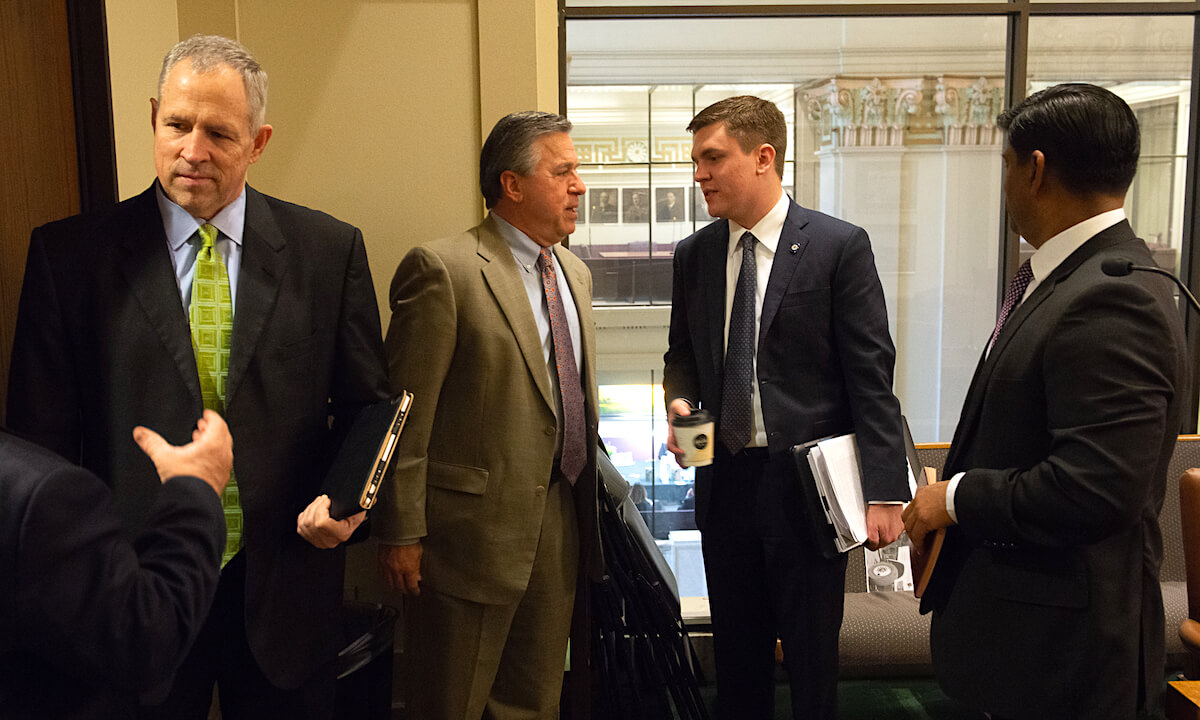
On background, nearly a dozen lobbyists with state agency contracts mentioned an attorney general’s opinion from 1995 that questions the legality of Stitt’s executive order.
“The Governor is not empowered, under the provisions of 74 O.S. Supp.1994, § 840-2.14, to issue executive orders freezing or limiting the power of State agencies, boards and commissions to enter into professional or personal service contracts,” then-Attorney General Drew Edmondson wrote.
Edmondson had been asked by then-Rep. Gary Bastin (D-Del City) whether a provision in the Oklahoma Personnel Act allowing the governor to institute hiring freezes also allowed him or her to freeze professional or personal service contracts. Bastin is now a lobbyist, but he holds no agency contracts.
Edmondson determined the governor does not have the authority to limit service contracts, although an AG’s opinion does not carry the force of law. It could, however, weigh heavily in court if someone challenged Stitt’s executive order, but that seems unlikely to many lobbyists who spoke on background.
“I don’t think you really do,” Gaines said when asked if agencies or existing lobbyists could try to challenge Stitt’s decision.
Spreadsheet detailing state agencies’ private lobbying contracts
From FY 2015 through FY 2019, Oklahoma agencies, boards and commissions spent about $6.75 million on contract lobbyists. Meanwhile, hundreds of state employees were registered as legislative liaisons at a larger total expense.
Harder said legislative liaisons are better representatives of agencies because they have fewer conflicts of interest.
“Whether the agency likes to hear it or not, we have lobbyists that walk in the door and want to tell us they are lobbying for one agency, but then they back in questions and favors for their private-sector client because they have 10 clients. That’s not good government either,” Harder said. “I’m clearly not going to turn down a lobbyist who is there to talk to us about our own agency, but it’s not right when they couple that meeting with something for someone in the private sector.”
The largest contract shown in the document below is between the Oklahoma Lottery Commission and Saxum Public Relations. Starting in FY 2017, the commission has paid Saxum $140,000 annually for a package of public affairs efforts. Saxum’s contract includes money to pay lobbyists selected by the commission, and Saxum provides other services as well.
“We utilize Saxum to help us develop a comprehensive public affairs strategy, and lobbying is a pass through cost that the lottery pays for as part of that overall strategy,” Lottery Commission deputy director Jay Finks said in a statement. “This strategy has been successful as we have been able to further our mission of contributing more money to education. The lottery is committed to following the rules as they are laid out by the governor. Whether or not we are allowed to use lobbyists moving forward, our mission to grow sales and profits so we can provide more money to education will not change.”
In recent years, the commission successfully advocated for reforms to the Oklahoma Education Lottery Act, lowering the percentage requirement of program dollars sent to education, thus raising the value of prizes, increasing participation and ultimately bringing in more dollars to the state for education funding.
The PDF below has been modified and extracted from data provided by the Stitt administration. NonDoc added additional details in an attempt to provide a more thorough picture of the data. A Microsoft Excel version of the data can be found here.
 Loading...
Loading...
(Editor’s note: This story was updated to add an additional quote from Harder at 7:25 a.m. Friday, June 7.)








